|
|
|
Sort Order |
|
|
|
Items / Page
|
|
|
|
|
|
|
| Srl | Item |
| 1 |
ID:
124323
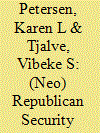

|
|
|
|
|
| Publication |
2013.
|
| Summary/Abstract |
Written from a vantage point in between Security Studies, Political Theory, and Governance Studies, this article attempts to theorize the current mobilization of civil society for the purposes of "national security," "risk precaution," or "homeland resilience" as the emergence of a neo-republican form of security governance-a mode of governance more reliant on organicist means of social construction than on economic or individualist instruments of social control. We argue that if the discipline of International Relations (IR) wishes to understand the nature of this emerging security order, it needs to assume a more cross-disciplinary approach and to develop a much richer idea of republicanism as not only a political philosophy but also a practice of governance.
|
|
|
|
|
|
|
|
|
|
|
|
|
|
|
|
| 2 |
ID:
121414
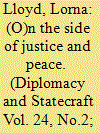

|
|
|
|
|
| Publication |
2013.
|
| Summary/Abstract |
Although very much an international novice, Canada secured election to the League Council in September 1927. It did not, on the whole, have a notable impact on its proceedings. Its people, too, were little moved by its presence at Geneva. And while its Prime minister enjoyed his one visit to the League, his scepticism about it remained undimmed. Nonetheless, its three-year Council term had a number of important consequences. It engineered what was on the face of it a significant amendment to League procedures regarding minorities. The experience and horizons of its Department of External affairs were widened. It became accepted that a Dominion-or India-should always sit on the Council. Its status-and that of the other Dominions-as states equal with Britain was underlined. And by demonstrating that it was not in Britain's pocket, Canada's political standing was greatly enhanced. Internationally, it had arrived.
|
|
|
|
|
|
|
|
|
|
|
|
|
|
|
|
| 3 |
ID:
127006
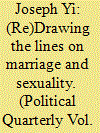

|
|
|
|
|
| Publication |
2013.
|
| Summary/Abstract |
The campaign for same-sex marriage is animated by two, contradictory impulses: a libertarian-egalitarian strain that continually expands the boundaries of what is publicly legitimate; and a conservative one that seeks to reinforce traditional boundaries. Democratic polities would benefit from public discussion on whether to retain normative, sexual boundaries, and if so, what they should reasonably be. I outline a moderately conservative agenda that would limit public legitimacy to sexually exclusive monogamy (heterosexual or homosexual), but informally tolerate most, consenting, nonconventional sexual practices. A spirit of humility, empathy and tragedy will help us to exercise reasonable judgement as we redraw the lines on marriage and sexuality.
|
|
|
|
|
|
|
|
|
|
|
|
|
|
|
|
| 4 |
ID:
122578
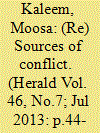

|
|
|
| 5 |
ID:
122539
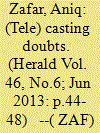

|
|
|
| 6 |
ID:
120790
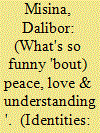

|
|
|
|
|
| Publication |
2013.
|
| Summary/Abstract |
The article examines current rock culture in the Balkans as a potential vehicle for rebuilding the broken sociocultural bonds between the different post-Yugoslav societies and for creating a constructive cultural space for articulating new forms of civic and post-nationalist identities. The argument offered is that, after the sociocultural exile during the war years, rock culture in the post-conflict Balkans has considerable potential to establish itself as a popular-cultural force of 'utopian transcendence' of the current ethno-nationalist sociopolitical moment, and as a catalyst of the new post-Yugoslav spirit of openness, tolerance and peaceful coexistence.
|
|
|
|
|
|
|
|
|
|
|
|
|
|
|
|
| 7 |
ID:
118927
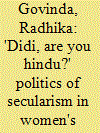

|
|
|
|
|
| Publication |
2013.
|
| Summary/Abstract |
In this paper I take the women's movement as the site for unpacking some of the strains and tensions involved in practical interpretations of secularism in present-day India. Several sources within and outside the movement point out that there has been a tendency to take the existence of secularism for granted, and that the supposedly secular idioms and symbols used for mobilizing women have been drawn from Hindu religio-cultural sources. Women from Dalit and religious minority communities have felt alienated by this. Hindu nationalists have cleverly appropriated these idioms and symbols to mobilize women as foot soldiers to further religious nationalism. Through a case-study of a grassroots women's NGO working in Uttar Pradesh, I seek to explore how women's organizations may be reshaping their agendas and activism to address this issue. Specifically, I will examine how and why the 2002 Gujarat riots affected the NGO, the ways in which it has started working on the issue of communal harmony and engaging with Muslims since the riots, and the challenges with which it has been confronted as a result of its efforts. In doing so, I will show how the complexities of NGO-based women's activism have become intertwined with the politics of secularism.
|
|
|
|
|
|
|
|
|
|
|
|
|
|
|
|
| 8 |
ID:
121533
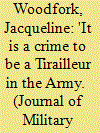

|
|
|
|
|
| Publication |
2013.
|
| Summary/Abstract |
Uniquely among European colonies, some indigenous inhabitants of the French West African colony of Senegal were made citizens of the metropole in the nineteenth century. This originaire status, as it was known, allowed them to, among other things, elect a member of the French parliament in Paris. But, the civil status of the colonial population of Senegal also influenced how its members who served in France's West African colonial army, the Tirailleurs sénégalais, were fed, clothed, housed, and paid. Using oral and archival sources, this article looks at how this cleavage between citizens and subjects influenced the relationship of Senegalese soldiers to the colonial state, the military, their officers, and each other.
|
|
|
|
|
|
|
|
|
|
|
|
|
|
|
|
| 9 |
ID:
121399
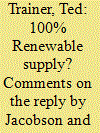

|
|
|
|
|
| Publication |
2013.
|
| Summary/Abstract |
I recently criticised the claim by Jacobson and Delucchi that renewable energy sources could meet world energy demand. Jacobson and Delucchi replied defending their position. This is a response to the main points made in that reply. The main issues are to do with intermittency of renewable energy sources and the implications for redundant plant and storage, vehicle to grid systems as a storage solution, the embodied energy costs of renewable energy, and overall system capital costs. It is argued that Jacobson and Delucchi do not provide satisfactory analyses of these issues and that they do not show that energy supply can be 100% renewable. This discussion is intended to clarify some of the core issues in the debate about the limits of renewable energy.
|
|
|
|
|
|
|
|
|
|
|
|
|
|
|
|
| 10 |
ID:
120578


|
|
|
|
|
| Publication |
2013.
|
| Summary/Abstract |
Armen Oganesyan, Editor-in-Chief of International Affairs: This year marks 200 years of the Battle of Borodino in the Patriotic War of 1812. How were you preparing for this anniversary? Which new exhibitions can one see?
A. Shkurko: Our main achievement was the putting together of the Museum of the 1812 Patriotic War. Incidentally, this was also a top priority item in the anniversary projects program approved by the federal government. It will be recalled that our predecessors set up in 1908 a special committee charged with establishing a museum of the 1812 Patriotic War. The idea was approved by Nicholas II and they launched a wide-ranging collection of exhibits, materials and funds for the museum. The subscription lists sent out to the provinces did not fetch much money but they brought back a lot of memorabilia. They came from the museums of military regiments, the descendants of 1812 war veterans and private collectors. The donations added up to nearly 20,000 objects and even a greater number of documents. There was a contest among the architects to design the museum building, but its construction was abandoned for lack of funds. In 1913, the interest in the anniversary petered out; then there came in succession the First World War, Civil War and other calamities.
|
|
|
|
|
|
|
|
|
|
|
|
|
|
|
|
| 11 |
ID:
118920
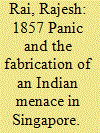

|
|
|
|
|
| Publication |
2013.
|
| Summary/Abstract |
This paper examines how local and transnational developments converged in 1857 to transform European attitudes towards Indian inhabitants in Singapore. Recognized in preceding years as useful to the security and the development of the colony, by late 1857, Indians in Singapore had come to be viewed by Europeans as a 'menace'. That change in disposition was largely the product of factors extraneous to the actions of the local Indian inhabitants themselves. Besieged by news of multiple challenges to the British Empire, European nerves were rattled by perceived threats emanating from sections of the Asian populace in Singapore. In early 1857, a dispute between Tamil-Muslims and Europeans brought to the fore the latter's anxieties and prejudices. That episode was followed, in May, by news of the massive rebellion of native troops in India. The emerging distrust for Indians was exacerbated by public rumours and fanned by editorials and reports published in the local press. Perceptions of immediate danger from the colony of transported convicts, and the fear of an Indian conspiracy during Muharram, sparked a panic that would have ramifications on the position of Indians in Singapore and leave an imprint on the long term political development of the Straits Settlements
|
|
|
|
|
|
|
|
|
|
|
|
|
|
|
|
| 12 |
ID:
127617
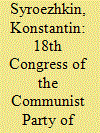

|
|
|
|
|
| Publication |
2013.
|
| Summary/Abstract |
The struggle at the very top of China's political establishment reached its peak on the eve of the 18th Communist Party Congress; this largely predetermined the balance of political forces in the upper echelons of the Communist Party and the decisions of its congress. The compromise about the top figures makes the party's political future very dim indeed. Although the retreating Hu-Wen Tandem managed to hold its ground, it is too early to say that the "reformers" have scored a final victory: in many respects the 18th Congress proved to be "transitional."
The final balance of power will become clear in five years' time after the next, 19th CPC Congress. It will probably clarify the course of the "fifth generation" of the country's leaders. It seems that the next five years can be best described as time of compromises. One has to admit that the criticized Hu-Wen Tandem left the country in fairly good shape; it compiled a reasonable "roadmap" with no alternative on the horizon.
It remains to be seen whether the new party and country leaders will manage in the next five years to avert social upheavals and fulfill the tasks formulated by the 18th Congress while following the roadmap.
|
|
|
|
|
|
|
|
|
|
|
|
|
|
|
|
| 13 |
ID:
124198
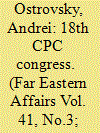

|
|
|
|
|
| Publication |
2013.
|
| Summary/Abstract |
The author examines the proceedings of the 18th CPC Congress and China's development plans for the 12th five-year period (2011 to 2015) and draws the conclusion that the next few years will be the most significant period in the country's ambitious efforts to build a "moderate prosperity society" (xiaokang) by 2020. To achieve this goal, China will have to double its GDP by 2020.
|
|
|
|
|
|
|
|
|
|
|
|
|
|
|
|
| 14 |
ID:
124997
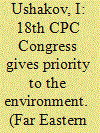

|
|
|
|
|
| Publication |
2013.
|
| Summary/Abstract |
The author gives a close-up view of the environment in China and looks at the reasons that impelled the country's leadership to put the environment on the list of key issues for discussion at the 18th CPC Congress. He also surveys where accents are placed in environment-related congress documents.
|
|
|
|
|
|
|
|
|
|
|
|
|
|
|
|
| 15 |
ID:
122567
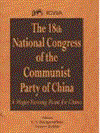

|
|
|
|
|
| Publication |
New Delhi, Pentagon Press, 2013.
|
| Description |
xiv, 341p.Hbk
|
| Standard Number |
9788182747241
|
|
|
|
|
|
|
|
|
|
|
|
Copies: C:2/I:0,R:0,Q:0
Circulation
| Accession# | Call# | Current Location | Status | Policy | Location |
| 057377 | 324.251075/RAN 057377 | Main | On Shelf | General | |
| 057557 | 324.251075/RAN 057557 | Main | On Shelf | General | |
|
|
|
|
| 16 |
ID:
125600
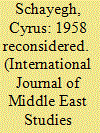

|
|
|
|
|
| Publication |
2013.
|
| Summary/Abstract |
Using Arabic, English, and French sources, and engaging Middle East and Cold War historians, this article makes a threefold argument. First, in United Arab Republic (UAR)-Syria, Jordan, and Lebanon, the 1958-59 explosion of domestic and regional tensions triggered state-formation surges. Second, these formed one process, which made those states more alike, with state-led socioeconomic planning playing a key role. Third, that process partook of a global Third World trend intersecting with the early Cold War. I draw three conclusions. Although existing scholarly readings that the events of 1958-59 in the Arab Middle East formed a crisis but not an ideological or political watershed are correct, from the viewpoint of state formation this crisis was a milestone. Moreover, UAR-Syria, Jordan, and Lebanon had persisting affinities and shared regional positions-notably, the fact that all were sandwiched between the unstable poles of the Arab state system, Iraq and Egypt-that shaped their individual postindependence histories of state formation. Last, Washington's low-profile involvement in this state-formation surge illustrates how domestic sociopolitics and regional geopolitics-including the UAR's peaking popularity and influence in 1958-59-affected U.S. policy in the Cold War postcolonial world.
|
|
|
|
|
|
|
|
|
|
|
|
|
|
|
|
| 17 |
ID:
127093
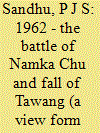

|
|
|
| 18 |
ID:
127111


|
|
|
| 19 |
ID:
127115
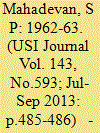

|
|
|
| 20 |
ID:
126757
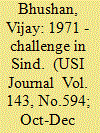

|
|
|
|
|
|
|
|